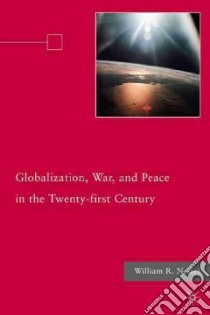Globalization, War, and Peace in the Twenty-first Century - 9780230106994
Un libro in lingua di Nester William R. edito da Palgrave Macmillan, 2010
- € 79.30
- Il prezzo è variabile in funzione del cambio della valuta d’origine
Violence is as old as humanity. Organized violence or war is as old as the first organized societies. Throughout history most states were either preparing for, engaging in, or recovering from war. Yet recently the threat or use of violence in international relations, known as geopolitics, has sharply diminished as nearly all states are at peace all or most of the time. Nonetheless geopolitical conflicts instigated by rogue states, militant ideologies, transnational terrorist groups, revolutionary movements, or voracious, ruthless economic interests continue to plague countries and regions around the world. Although each geopolitical conflict has unique causes, underlying them all is some volatile mix of the best and worst of human nature. Many a war has been fought under the lofty banner of justice, freedom, and equality. Many more, however, are provoked by the far darker motives of greed, aggression, fear, vengeance, hatred, and ignorance. Globalization, War, and Peace in the Twenty-first Century explores humanity's most persistent and tragic problem by answering five crucial questions: How is military power created and asserted? How do international laws and organizations constrain war? Why do nations go to war or stay at peace? What continuities and changes characterize recent warfare? What are weapons of mass destruction and what is the likelihood of them being used? What are the source, methods, and results of terrorism and counterterrorism? The emphasis is on recent headlines, with case studies on the war against Al Qaeda, the Iraq War, the Israeli-Palestinian conflict, attempts by North Korea and Iran to become nuclear powers, and other ongoing tragedies and threats. All along the book reveals why geopolitics persists even though the ever thickening web of interdependent relations among nation-states and peoples, known as globalization, sharply raises war's costs and reduces its benefits.
Informazioni bibliografiche
- Titolo del Libro in lingua: Globalization, War, and Peace in the Twenty-first Century
- Lingua: English
- Autore: Nester William R.
- Editore: Palgrave Macmillan
- Collana: Palgrave Macmillan (Hardcover)
- Data di Pubblicazione: 15 Novembre '10
- Genere: POLITICAL SCIENCE
- Argomenti : War Politics and war World politics 21st century
- Pagine: 198
- ISBN-10: 0230106994
- EAN-13: 9780230106994


